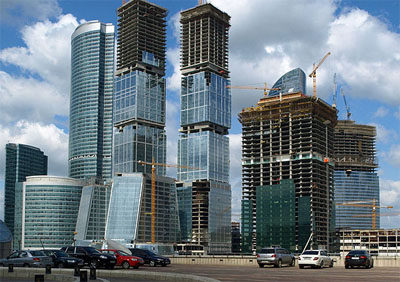ADVERTISEMENT
|
|
|
Russia Travel & Tourism Guide
Russia History - Russian Federation
NextGen Day offers travel tips and information for top travel places and best destinations in Africa, Asia, Australia, Europe, Middle East and United States of America. We feature Australia links, Australia resources and large selection of Australia budget airlines, Australia chartered planes, Australia sea cruises, Australia ferries, Australia travel agencies, Australia land transports and Australia attractions including Australia beaches, Australia medical tourism, Australia retirement homes, Australia historical and Australia pilgrimage tours.

Moscow International Business Center under construction. Moscow is the world's most expensive city for expatriates to live in.
During and after the disintegration of the USSR when wide-ranging reforms including privatisation and market and trade liberalization were being undertaken, the Russian economy went through a major crisis. This period was characterized by deep contraction of output, with GDP declining by roughly 50 percent between 1990 and the end of 1995 and industrial output declining by over 50 percent. In October 1991, Yeltsin announced that Russia would proceed with radical, market-oriented reform along the lines of "shock therapy", as recommended by the United States and International Monetary Fund. Price controls were abolished, privatization was started. Millions plunged into poverty. According to the World Bank, whereas 1.5% of the population was living in poverty in the late Soviet era, by mid-1993 between 39% and 49% of the population was living in poverty. Delays in wage payment became a chronic problem with millions being paid months, even years late. Russia took up the responsibility for settling the USSR's external debts, even though its population made up just half of the population of the USSR at the time of its dissolution. The privatization process largely shifted control of enterprises from state agencies to groups of individuals with inside connections in the Government and the mafia. Violent criminal groups often took over state enterprises, clearing the way through assassinations or extortion. Corruption of government officials became an everyday rule of life. Many of the newly rich mobsters and businesspeople took billions in cash and assets outside of the country in an enormous capital flight. The long and wrenching depression was coupled with social decay. Social services collapsed and the birth rate plummeted while the death rate skyrocketed. The early and mid-1990s was marked by extreme lawlessness. Criminal gangs and organized crime flourished and murders and other violent crime spiraled out of control.
In 1993 a constitutional crisis resulted in the worst civil strife in Moscow since the October Revolution. President Boris Yeltsin illegally dissolved the country's legislature which opposed his moves to consolidate power and push forward with unpopular neo-liberal reforms; in response, legislators barricaded themselves inside the White House, impeached Yeltsin and elected a new President and major protests against Yeltsin's government resulted in hundreds killed. With military support, Yeltsin sent the army to besiege the parliament building and disperse its defenders and used tanks and artillery to eject the legislators.
The 1990s were plagued by armed ethnic conflicts in the North Caucasus. Such conflicts took a form of separatist Islamist insurrections against federal power, or of ethnic/clan conflicts between local groups. Since the Chechen separatists declared independence in the early 1990s, an intermittent guerrilla war (First Chechen War, Second Chechen War) has been fought between disparate Chechen rebel groups and the Russian military. Terrorist attacks against civilians carried out by Chechen separatists, most notably the Moscow theater hostage crisis and Beslan school siege, caused hundreds of deaths and drew worldwide attention. High budget deficits and the 1997 Asian Financial Crisis caused the financial crisis of 1998 and resulted in further GDP decline. On 31 December 1999 Boris Yeltsin resigned from the presidency, handing the post to the recently appointed prime minister, Vladimir Putin, who then won the 2000 election. Putin won popularity for suppressing the Chechen insurgency, although sporadic violence still occurs throughout the North Caucasus. High oil prices and initially weak currency followed by increasing domestic demand, consumption and investments has helped the economy grow for nine straight years, alleviating the standard of living and increasing Russia's clout on the world stage. While many reforms made during the Putin administration have been generally criticized by Western nations as un-democratic, Putin's leadership over the return of order, stability and progress has won him widespread popularity in Russia. On March 7, 2008, Dmitry Medvedev was elected President of Russia.
Source : Wikipedia Encyclopedia
Hotels, Vacations & Holidays in Russia, Europe |

